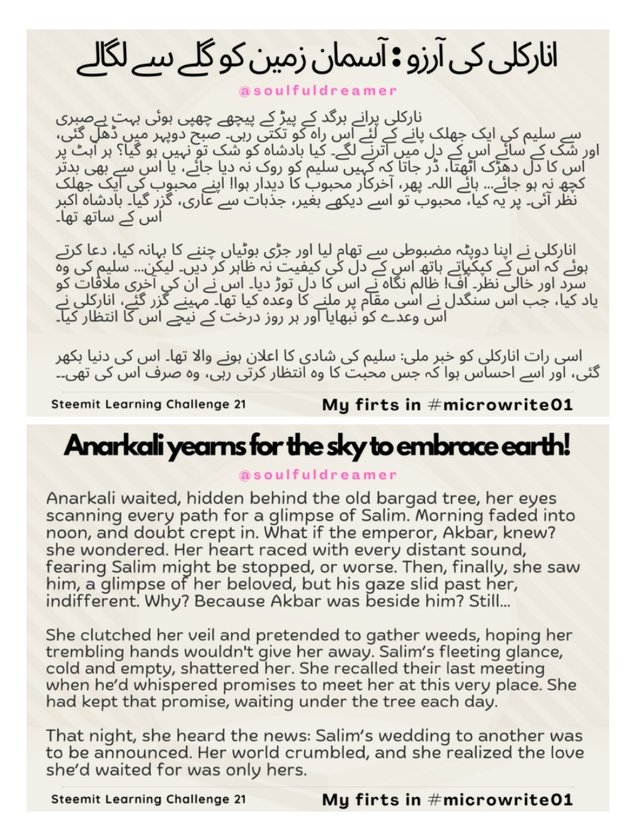First condensation
Hello #microwrite03 readers, evaluators, and my Steemit friends. This is a condensed version of my original Anarkali micro story
اُردو ورژن
" وفادار غداری"
انارکلی برگد کے درخت کے پیچھے چھپ گئی، آنکھیں سلیم کے لیے بے چین تھیں۔ شام اتر آئی، اور خوف نے اس کے دل میں بسیرا کر لیا۔ آخرکار وہ آیا، لیکن اس کی نظریں اس کے اوپر سے اس طرح گزر گئیں جیسے وہ اجنبی ہو۔ اس کا دل تڑپ اُٹھا جب اس نے لرزتے ہاتھوں سے اپنا چہرہ چھپا لیا۔
اے بے رحم، تم نے ایک نظر بھی اپنی انارکلی کی طرف نہیں دیکھا۔"
وہ رات شادی کے ڈھول کی آوازوں سے گونج اٹھی ـ میرا دل ٹوٹ گیا۔ میں اس شادی کا غم نہیں منا رہی تھی۔ یہ مرجھایا ہوا پتا اُس زندگی کا ماتم کر رہا تھا جو چھن چکی تھی!
English version
Loyal Betrayal
Anarkali hid behind the banyan tree, eyes desperate for Salim. Dusk fell, and fear gnawed at her. At last, he appeared, but his gaze passed over her like a stranger’s. Her heart clenched as she veiled her face with trembling hands.
"Oh cruel one, you didn’t even turn back to look at your Anarkali."
The wedding drums echoed that night! My heart shattered, but not for the reason they thought. I wasn’t mourning his marriage; this withered leaf was grieving the life that had been taken.
(88 words including the title: checked via wordcounter.net)

Edit:
Loyal Betrayal
Anarkali hid behind the tree, yearning for Salim’s gaze, but he looked past her as a stranger. Her heart broke as she veiled herself, whispering, “You didn’t turn back for your Anarkali.” That night, wedding drums echoed, but she grieved a lost love or maybe lost life?
this version was evaluated after improvement
Reflection/ Writing process:
Genre: Historical fiction/ romance
Narrative Technique:
The story initially unfolds from a third-person limited perspective, allowing the reader to observe only Anarkali’s emotions from a distance. The narrator is unaware of Salim's feelings or his erratic behavior. He sees Salim only through Anarkali's eyes. And then, in the final moments, the narrative shifts to the first-person point of view, allowing Anarkali to express her inner conflict directly, making the revelation more intimate and impactful.
The title:
"Loyal Betrayal" is both intriguing and paradoxical, encapsulating the central conflict of the story. The title came to me naturally after I had written the story. I wrote the story first and then thought of the title. It perfectly reflects the inner turmoil and the complex emotional layers of the protagonist.
Keeping the Central Theme Close to the Legend While Condensing the Story:
Anarkali, a legendary figure from the Mughal Empire, is known for her tragic love story with Prince Salim (later Emperor Jahangir). Their love was opposed by his father, Emperor Akbar, leading to Anarkali's fate being portrayed in various ways, including being buried alive or exiled. The tale symbolizes themes of forbidden love, sacrifice, and loyalty, and has been romanticized in literature and film.
Preserving Key Details in a Condensed Format:
In condensing the story, I focused on preserving key emotional details, like Anarkali’s trembling hands as she tries to veil her face emotions, and the distant sounds of wedding drums. These small yet significant elements set the mood and convey the tension of the moment, maintaining the emotional depth and atmosphere despite the shortened format.
Turning point:
The wedding drums symbolize a turning point in my story, amplifying the emotional tension. In our culture, these sounds have a profound impact, often accompanied by a traditional folk song that reflects a bride’s bittersweet departure from her home, capturing both joy and sorrow. However, in this case, the drums mark a pivotal moment for the protagonist, adding emotional complexity to the narrative. Ironically, they highlight themes of betrayal and heartbreak, as Salim is set to marry another woman, forcing Anarkali, a courtesan, to endure the pain of witnessing it all.
Uncertain ending/ twist?
By ending on a note of uncertainty, I aimed to spark curiosity about Anarkali's fate and the nature of 'loyal betrayal,' encouraging readers to reflect on the complexities of love and loyalty - a central theme in the legend Anarkali.
So you can say, I've added a twist to the ending compared to my original version from Task 1. Now, my readers are left questioning who betrayed whom. In the first version, the story ended with Anarkali's despair, but now there’s a deeper element of betrayal. What do you think?
Symbolism:
Please note that Anarkali symbolizes beauty, youth, and vibrance, much like the flower of a pomegranate blossom (which is the literal meaning of the word Anarkali). The "withered leaf," on the other hand, contrasts this by representing decay, loss, and the fading of life or beauty.
Now, I have the narrator (first person, i.e., Anarkali) addressing herself as the withered leaf instead of Anarkali in the last line. This mode of address adds a deeper layer of emotional and symbolic complexity to the narrative. Her adoption of the "withered leaf" identity reflects the disintegration of her sense of self, which aligns with the theme of betrayal.
This withered leaf was grieving the life that had been taken!
P.S: The reflection part of the post was not required in the task. However, you have reflected on your story in the example post. So, if it's unnecessary, I will edit it. Otherwise, I will keep it.
Thank you so much for this delightful assignment. I truly enjoyed every step of the process. @joslud @solperez, much gratitude and warm regards.
Edit: I am sharing the microstory from Task 1 in the form of a brochure for easy comparison:

The brochure is courtesy of @joslud
¡Holaaa amigo!🤗
Una historia de desamor que causa mucha tristeza y, a pesar de que solo tenías que utilizar 100 palabras o menos, supiste plasmar al igual que transmitir lo esencial y, eso sin duda alguna es fascinante así que te felicito por ello.
Te deseo mucho éxito en la dinámica... Un fuerte abrazo💚